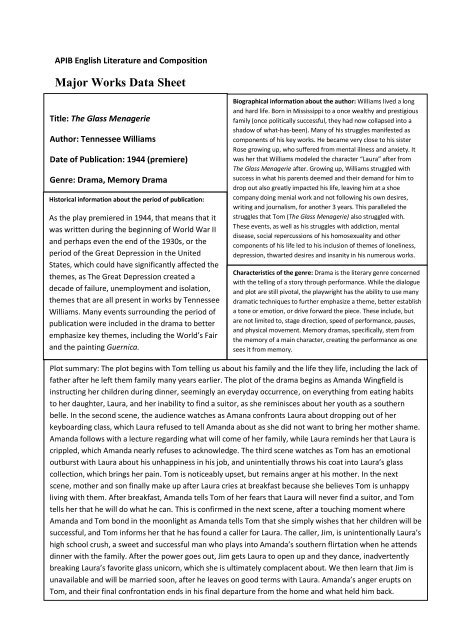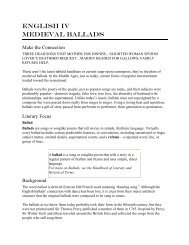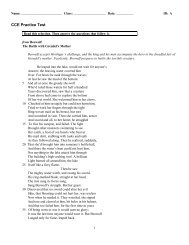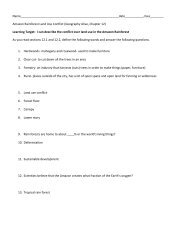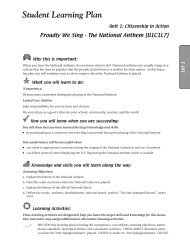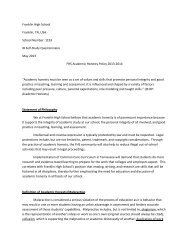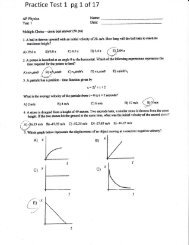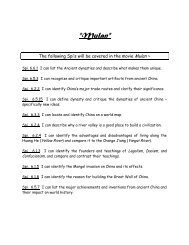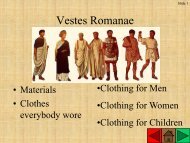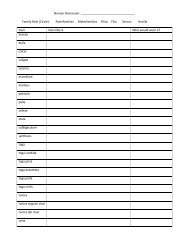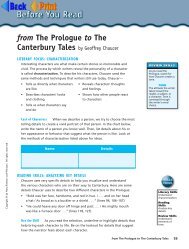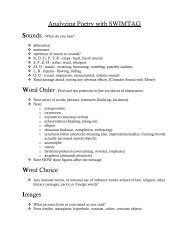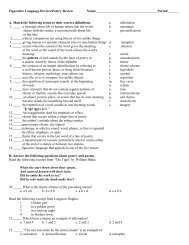Major Works Data Sheet
Major Works Data Sheet
Major Works Data Sheet
You also want an ePaper? Increase the reach of your titles
YUMPU automatically turns print PDFs into web optimized ePapers that Google loves.
APIB English Literature and Composition<br />
<strong>Major</strong> <strong>Works</strong> <strong>Data</strong> <strong>Sheet</strong><br />
Title: The Glass Menagerie<br />
Author: Tennessee Williams<br />
Date of Publication: 1944 (premiere)<br />
Genre: Drama, Memory Drama<br />
Historical information about the period of publication:<br />
As the play premiered in 1944, that means that it<br />
was written during the beginning of World War II<br />
and perhaps even the end of the 1930s, or the<br />
period of the Great Depression in the United<br />
States, which could have significantly affected the<br />
themes, as The Great Depression created a<br />
decade of failure, unemployment and isolation,<br />
themes that are all present in works by Tennessee<br />
Williams. Many events surrounding the period of<br />
publication were included in the drama to better<br />
emphasize key themes, including the World’s Fair<br />
and the painting Guernica.<br />
Biographical information about the author: Williams lived a long<br />
and hard life. Born in Mississippi to a once wealthy and prestigious<br />
family (once politically successful, they had now collapsed into a<br />
shadow of what-has-been). Many of his struggles manifested as<br />
components of his key works. He became very close to his sister<br />
Rose growing up, who suffered from mental illness and anxiety. It<br />
was her that Williams modeled the character “Laura” after from<br />
The Glass Menagerie after. Growing up, Williams struggled with<br />
success in what his parents deemed and their demand for him to<br />
drop out also greatly impacted his life, leaving him at a shoe<br />
company doing menial work and not following his own desires,<br />
writing and journalism, for another 3 years. This paralleled the<br />
struggles that Tom (The Glass Menagerie) also struggled with.<br />
These events, as well as his struggles with addiction, mental<br />
disease, social repercussions of his homosexuality and other<br />
components of his life led to his inclusion of themes of loneliness,<br />
depression, thwarted desires and insanity in his numerous works.<br />
that led him to success before his death in a drug-related incident.<br />
Characteristics of the genre: Drama is the literary genre concerned<br />
with the telling of a story through performance. While the dialogue<br />
and plot are still pivotal, the playwright has the ability to use many<br />
dramatic techniques to further emphasize a theme, better establish<br />
a tone or emotion, or drive forward the piece. These include, but<br />
are not limited to, stage direction, speed of performance, pauses,<br />
and physical movement. Memory dramas, specifically, stem from<br />
the memory of a main character, creating the performance as one<br />
sees it from memory.<br />
Plot summary: The plot begins with Tom telling us about his family and the life they life, including the lack of<br />
father after he left them family many years earlier. The plot of the drama begins as Amanda Wingfield is<br />
instructing her children during dinner, seemingly an everyday occurrence, on everything from eating habits<br />
to her daughter, Laura, and her inability to find a suitor, as she reminisces about her youth as a southern<br />
belle. In the second scene, the audience watches as Amana confronts Laura about dropping out of her<br />
keyboarding class, which Laura refused to tell Amanda about as she did not want to bring her mother shame.<br />
Amanda follows with a lecture regarding what will come of her family, while Laura reminds her that Laura is<br />
crippled, which Amanda nearly refuses to acknowledge. The third scene watches as Tom has an emotional<br />
outburst with Laura about his unhappiness in his job, and unintentially throws his coat into Laura’s glass<br />
collection, which brings her pain. Tom is noticeably upset, but remains anger at his mother. In the next<br />
scene, mother and son finally make up after Laura cries at breakfast because she believes Tom is unhappy<br />
living with them. After breakfast, Amanda tells Tom of her fears that Laura will never find a suitor, and Tom<br />
tells her that he will do what he can. This is confirmed in the next scene, after a touching moment where<br />
Amanda and Tom bond in the moonlight as Amanda tells Tom that she simply wishes that her children will be<br />
successful, and Tom informs her that he has found a caller for Laura. The caller, Jim, is unintentionally Laura’s<br />
high school crush, a sweet and successful man who plays into Amanda’s southern flirtation when he attends<br />
dinner with the family. After the power goes out, Jim gets Laura to open up and they dance, inadvertently<br />
breaking Laura’s favorite glass unicorn, which she is ultimately complacent about. We then learn that Jim is<br />
unavailable and will be married soon, after he leaves on good terms with Laura. Amanda’s anger erupts on<br />
Tom, and their final confrontation ends in his final departure from the home and what held him back.
<strong>Major</strong> <strong>Works</strong> <strong>Data</strong> <strong>Sheet</strong> Page 2<br />
Describe the author’s style, incl narrator/point of<br />
view, metaphors/similes:<br />
The narration is done with a significant amount of<br />
pretentiousness and grandious idioms. Amanda’s<br />
remote Southern accent and idiomatic expressions<br />
(from her Southern decadence past) contrasts with<br />
the others’ more urban colloquialism. Because Tom<br />
is the narrator, his point-of-view is the most<br />
significant as it shadows everything that is done.<br />
Examples that demonstrate the style:<br />
"A blown-up photograph of the father hangs on the<br />
wall of the living room, to the left of the archway. It is<br />
the face of a very handsome young man in a<br />
doughboy's First World War cap. He is gallantly<br />
smiling, ineluctably smiling, as if to say, "I will be<br />
smiling forever." (Scene I, stage directions)<br />
"Oh! I felt so weak I could barely keep on my feet! I<br />
had to sit down while they got me a glass of water!<br />
Fifty dollars’ tuition, all of our plans – my hopes and<br />
ambitions for you – just gone up the spout, just gone<br />
up the spout like that." (scene II, line 16).<br />
Memorable Quotes*continues at end; couldn’t fit without messing up whole template<br />
Quote<br />
“The Wingfield apartment is in the<br />
rear of the building, one of those<br />
vast hivelike conglomerations of<br />
cellular living-units[. . .] in overcrowded<br />
urban centers [. . .] [that is]<br />
symptomatic of the impulse of this<br />
*… + enslaved section of America”<br />
(scene I, 1868)<br />
“Well, in the South we had so many<br />
servants. Gone, gone, gone. All<br />
vestige of gracious living! Gone<br />
completely! I wasn’t prepared for<br />
what the future brought me. All of<br />
my gentlemen callers were sons of<br />
planters and so of course I assumed<br />
that I would be married to one and<br />
raise my family on a large piece of<br />
land with plenty of servants.” (scene<br />
VI, 1789)<br />
“LAURA: Oh, be careful –If you<br />
breathe, it / breaks! JIM: I’d better<br />
not take it. I’m pretty clumsy with<br />
things / LAURA: Go on, I trust you<br />
with him!” (scene VI, 1905)<br />
Significance<br />
-The opening stage description is very significant as it<br />
reflects many key themes of the drama. The enclosed, hivelike<br />
homes and “enslaved” description describes the overall<br />
theme of being stuck in their reality, wishing for an escape<br />
-This quote represents Amanda’s past of southern<br />
decadence, and her thwarted desires and dreams regarding<br />
what her life would be. This quote exposes the motivation<br />
behind all of Amanda’s pressures on her children, especially<br />
the pressure she places on her daughter, Laura, to find a<br />
suitor.<br />
-This quote represents Laura and her willingness to please<br />
not only her suitor, but her mother. Like her glass, Laura is<br />
fragile and beautiful, but wants Jim to take her, in terms of<br />
marriage. Jim admits to being clumsy, as he ultimately is by<br />
unknowingly leading Laura and Amanda on.
Name<br />
Tom<br />
Wingfield<br />
Amanda<br />
Wingfield<br />
Laura<br />
Wingfield<br />
Characters<br />
Role in the story Significance Adjectives<br />
Narrator of the drama,<br />
as it is his memory that<br />
is the Drama. Tom<br />
works at a menial job at<br />
a shoe company, and<br />
escapes afterwards<br />
through literature,<br />
alcohol and movies. He<br />
desires to become a<br />
writer, but feels held<br />
back by and an<br />
obligation to his family.<br />
The mother of Tom and<br />
Laura Wingfield,<br />
Amanda wishes for the<br />
best for her children as<br />
she holds onto her past.<br />
Growing up, she was<br />
the belle of her<br />
Southern youth, with<br />
male-callers at her door<br />
quite frequently, and<br />
she now wishes the<br />
same for her daughter,<br />
struggling as a singlemother<br />
after the loss of<br />
her husband roughly 16<br />
years prior.<br />
The female counterpart<br />
to Tom, Laura is his<br />
sister and the daughter<br />
of Amanda. Slightly<br />
disabled, Laura has a<br />
very gentle soul and<br />
very fragile mental<br />
health. She is frequently<br />
anxious and afraid. Her<br />
secret failure at Typing<br />
class causes her pain, as<br />
she refuses to inform<br />
her mother and instead<br />
spends her time<br />
elsewhere. Failing to<br />
have a male-suitor,<br />
Laura is pushed by her<br />
mother to impress a<br />
man enough to secure<br />
marriage.<br />
It is through Tom’s memories that we<br />
see everything, so it is with any bias<br />
that he contains that we see his world;<br />
However, this bias appears to be little<br />
or none. It is through Tom’s role in the<br />
plot that many themes are brought out,<br />
as well as the manifestations of<br />
William’s reality: thwarted hopes and<br />
dreams, menial work due to familial<br />
obligations, and a struggle with<br />
addiction due to a lack of known<br />
purpose in life.<br />
Amanda is the foil to both Tom and<br />
Laura’s character development. It is<br />
Amanda who pushes her children to be<br />
successful, and through that making<br />
them unhappy in who they are and who<br />
they are becoming, as they are neither<br />
following their heart nor happy in their<br />
journey of life. However, it is Amanda<br />
who shows the most generous display<br />
of love for her children, as she works a<br />
hard life in subscription sales while<br />
attempting to keep up her social life<br />
and prestige and attaining a successful<br />
suitor for her daughter, Laura, all<br />
without neither a husband to help nor a<br />
single complaint.<br />
Laura presents pure, raw and fragile<br />
emotion. She is very empathic, as she<br />
cries when her brother and mother are<br />
upset, showing pure compassion<br />
without any other motive. She is<br />
represented as a rarity, and this is<br />
further emphasized with her slight<br />
disability. She represents a childhood<br />
innocence, and is pushed by her mother<br />
to reach womanhood and find a suitor.<br />
Unfortunately, her failure simply brings<br />
her mother and herself pain. However,<br />
she is shown to have a very strong will<br />
in her determination not to bring shame<br />
to her mother or family by walking for<br />
long periods of time in the winter while<br />
she is supposed to be in class, to<br />
prevent her mother or anyone else from<br />
finding out what is really occurring.<br />
Real, Strong, Dreaming,<br />
Potential-filled, Lost,<br />
Addicted, Held-Back,<br />
Aspiring, Hopeful,<br />
Loving, Caring.<br />
Strong-Willed, Faded,<br />
Determined, Hard-<br />
Working, Loving,<br />
Careful, Flirtatious,<br />
Courteous<br />
Fragile, Raw, Pure,<br />
Innocent, Strong-<br />
Willed, Caring,<br />
Compassionate, Shy,<br />
Gentle, Empathic,<br />
Emotional, Fearful
Jim<br />
O’Conner<br />
Mr. Wingfield<br />
The potential suitor<br />
brought home by Tom<br />
for his sister Laura, Jim<br />
is in reality Laura’ high<br />
school crush. He is<br />
seemingly a dream<br />
come true for the<br />
family, and Amanda<br />
flirts with him in an<br />
attempt to secure a<br />
marriage for her<br />
daughter Laura<br />
The lost husband of<br />
Amanda, and father of<br />
Laura and Tom. His<br />
picture hangs above the<br />
mantel place<br />
The drama takes place in the Wingfield’s apartment<br />
in the urban-landscape of St. Louis, MO. The<br />
apartment is described as a part of a beehive of<br />
apartments, better emphasizing the inhumanity of<br />
their existence and their home, and emphasizing the<br />
feeling of being trapped that many characters feel.<br />
The existence of the fire escape in the apartment is a<br />
crucial addition, as it provides a singular escape from<br />
the set of the apartment, and foreshadows a<br />
method of escape existing for Tom. Lights, actions<br />
and sounds are routinely heard through the play<br />
from the surroundings around the apartment,<br />
emphasizing the potentiality of life and freedom that<br />
exists outside of the apartment.<br />
Jim is the representation of many<br />
things. First of all, he is everything that<br />
Amanda wants for her family, and she<br />
finds it her goal to capture him. For<br />
Laura, Jim embodies all of her wants<br />
and desires, as he is everything Laura<br />
ever wanted in high school. However,<br />
the fact that the Amanda and Laura fail<br />
to secure him due to another girl he has<br />
been seeing is a representation of the<br />
theme of thwarted hopes and dreams.<br />
His portrait represents a lost-perfection<br />
and lost-hope that Amanda had, as he<br />
was a promising husband that<br />
ultimately resulted in her struggles as a<br />
single mother.<br />
Hopeful, Sweet, Strong,<br />
Capable, Successful,<br />
Promising, Nice,<br />
Courteous<br />
Not Present, Lost<br />
Setting Significance of the opening scene<br />
Symbols<br />
The Glass Menagerie (Specifically the Unicorn) –<br />
These represent Laura’s fragility and yet unique<br />
beauty. When the horn breaks, the Unicorn<br />
becomes damaged yet beautiful (like Laura) and<br />
ultimately she gives it to Jim<br />
Flowers (Specifically Jonquils/Blue Roses) – This<br />
symbol is used when describing Amanda’s past,<br />
being beautiful in her days of southern decadence.<br />
The Fire Escape – The singular avenue out of the<br />
apartment, the escape represents Tom’s ability to<br />
leave his situation and escape to the sounds and life<br />
of the city around their apartment.<br />
The opening of the play introduces the<br />
audience to the family dynamics that exist<br />
within the Wingfields. We are introduced to<br />
Amanda as she instructs Tom regarding things<br />
such as his eating habits and Laura regarding<br />
how to remain pretty and wait for gentleman<br />
callers (who Laura knows will never come).<br />
Amanda introduces her past of being the most<br />
called upon girl of her southern society at<br />
Laura’s age. Finally, we watch as Amanda tells<br />
each of her children what to do after dinner,<br />
showing her controlling and demanding<br />
parenting style.<br />
Significance of the ending/closing scene<br />
The closing scene is of the repercussions of Jim<br />
O’Conner already being engaged and him<br />
leaving. Amanda and Tom get in a fight, and<br />
Amanda tells Tom that he is worthless,<br />
incapable of taking care of his family, and that<br />
he does not care about them. Tom ultimately<br />
leaves, following his heart and dreams and<br />
experiencing the world on his own. However,<br />
he laments that he could never forget about his<br />
sister Laura, who will always be a part of his<br />
memory and his existence.
<strong>Works</strong> Cited<br />
SparkNotes Editors. “SparkNote on The Glass Menagerie.” SparkNotes.com. SparkNotes LLC. 2003. Web.<br />
______13 Apr. 2011.<br />
Roberts, James L. CliffsNotes on The Glass Menagerie. 19 Apr 2011<br />
______.<br />
"The Glass Menagerie." Shmoop: Study Guides & Teacher Resources. Web. 19 Apr. 2011.<br />
______.<br />
Possible Themes: Use 3 text examples for support. Document correctly.<br />
1) When is one confined in their existence?<br />
1) Tom’s relationship with his family<br />
2) Amanda, and her being confined to her role as a single-mother<br />
3) Laura, and being confined to her disabled body<br />
2) Can one ever escape their past and memory?<br />
1) The fact that the entire drama is Tom’s memory<br />
2) The recurring role of Amanda’s past in her life and in the raising of her children<br />
3) The reappearance of Jim, a high-school crush of Laura’s that she falls back in love with<br />
4) The role of Mr. Wingfield in the entire piece<br />
3) Is the ability for one to reach their dreams ever, truly, possible?<br />
1) Tom had to escape his reality to find his dreams<br />
2) Laura’s dreams are to be happy in her world, which typically means isolating herself<br />
3) Amanda’s dreams for the success of her children, which she has very little control over<br />
**I was not sure which boxes to use: the ones from the raw template, or the ones from Rocky Stone.<br />
I ultimately tried to follow the raw template as it covered everything the Rocky Stone example did,<br />
however my final Theme box is a little convoluted mix of the two.<br />
Quote<br />
“TOM: All right, I will! The more you<br />
shout about my selfishness to me<br />
the / quick I’ll go, and I won’t go to<br />
the movies! AMANDA: Go, then!<br />
Then go to the moon – you selfish<br />
dreamer!” (Scene VII, 1910)<br />
“LAURA: Now it is just like all the<br />
other horses. / JIM:It’s lost its - /<br />
LAURA: Horn! It doesn’t matter.<br />
Maybe it’s a blessing in disguise.”<br />
(Scene VII, 1906)<br />
(Continuation from Above)<br />
Significance<br />
-This quote occurs as Tom decides to leave the apartment<br />
and leave behind the restrictions that hold him back.<br />
Amanda’s taunting, telling him to go to the moon, is very<br />
ironic, as Tom chooses to leave to follow his dreams and the<br />
greater world around him.<br />
-This quote references the loss of the uniqueness of the<br />
unicorn, and Laura’s complacent reaction to it. Like the<br />
unicorn becoming a normal horse, while Laura was dancing<br />
she felt normal, and this glee was the reason she was happy<br />
after the loss of the unicorn’s horn.


